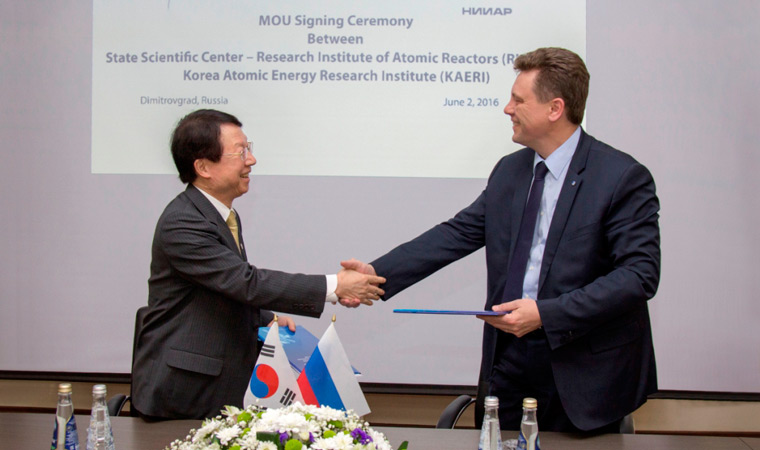
Russia, Korea expand cooperation in science
back to contentsIt is not the first Korean company among RIAR’s customers. In addition to a number of long-term contracts for research and development, RIAR signed in late October 2015 a new contract with KAERI for irradiation and testing of experimental fuel elements in the BOR-60 fast breeder reactor. Russia and South Korea are negotiating some more contracts for in-pile and post-irradiation tests at experimental research facilities of Rosatom’s R&D division.
According to the new contract, RIAR and KAERI as major R&D institutions of the two countries in sustainable nuclear development will focus their efforts on joint tests, expert discussion, scientific publications and professional competencies of the academic staff.
RIAR is Russia’s largest nuclear testing facility providing testing services to foreign customers. The scale and technological level of today’s challenges faced by the global nuclear industry require expanding international R&D cooperation. “Taking into account RIAR’s unparalleled testing facilities, KAERI’s rapid advance in nuclear testing and solid expertise in joint experiments, the new memorandum will become a cornerstone of further cooperation between the institutes,” said RIAR Director Alexander Tuzov.
In his turn, KAERI President Jong Kyung Kim stressed the importance of the memorandum. “This is an essential step towards technical cooperation and a contribution to the development of expertise and knowledge in the field of nuclear fuel, non-fuel components and structural materials for advanced reactors, irradiation tests and post-irradiation studies, operation and maintenance of sodium-cooled fast reactors (SFR), fuel cycle technologies, etc.”
During a technical tour to RIAR, KAERI delegates visited the construction site of MBIR, a multi-purpose fast breeder reactor which RIAR began to build in September 2015. Later on, MBIR may become a unique testing site for KAERI and many other global scientific centers. This will be the world’s most powerful research reactor in operation. The plans are to establish an international research center (IRC) on the premises of MBIR.
With its unparalleled specifications, MBIR will solve a broad variety of research tasks crucial for a long-term development of nuclear power industry. The reactor will be used to do research in the fields of material science, reactor physics and safety, test new components of the reactor core, control and diagnostic tools, produce isotopes, etc.




